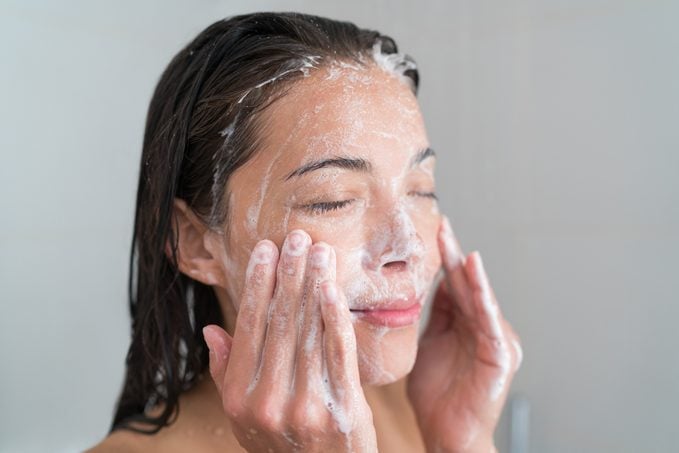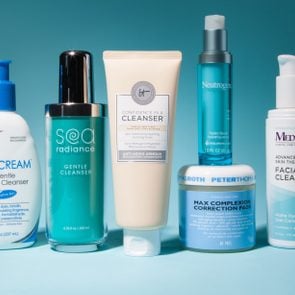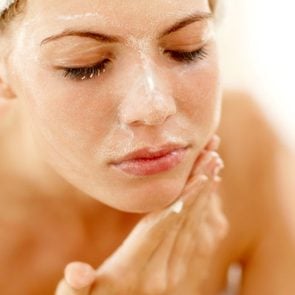How Bad Is It to Wash Your Face in the Shower? Skin Care Experts Explain
Updated: May 18, 2021
Washing your face in the shower is convenient, but is it bad for your skin? Here's the real story—plus expert tips on caring for your skin.
Our editors and experts handpick every product we feature. We may earn a commission from your purchases.
Washing your face in the shower
Certain tidbits of beauty wisdom are repeatedly passed from parent to child and from friend to friend: Don’t forget to apply sunscreen on your hands. Keep your eye cream in the fridge. Use dry shampoo before bed instead of in the morning for better results. And whatever you do, take off your makeup before hitting the sack.
Then there’s this one: Never wash your face in the shower.
This stems from a water temperature concern: Unless you’re taking a cold or lukewarm shower (and if you are, more power to you), the water you’ll be using on your face is hot.
“Hot water can strip the skin of natural oils,” explains Miami-based board-certified dermatologist Annie Gonzalez, MD, of Riverchase Dermatology. That’s bad because it can dry out your skin.
But does this mean you really shouldn’t wash your face in the shower? We spoke with dermatologists to get the scoop and to learn the best ways to wash your face.
How often should you wash your face?
Unless you’re a skin care junkie, face washing is one of those things you probably don’t give a ton of thought to, even though you know you’re supposed to do it once or twice a day, depending on your skin type and conditions.
So what is the optimal amount of face washing? It depends on a few different factors, including your skin type.
If you wear makeup, you’ll fall in the twice-a-day camp. “Most people should wash their face twice a day,” says Dr. Gonzalez. “Once in the morning and once in the evening, before going to bed, to remove dirt or makeup from the face.”
Battling acne or difficult skin? Washing your face twice a day will better keep your pores clean and your skin healthy.
However, if you have sensitive skin with certain skin conditions, you might want to ease up. “For those with eczema, dry, or combination skin, once a day is sufficient,” says Dr. Gonzalez.
Washing your face at different times of day provides different results.
“In the morning, cleansing your face will help to remove sweat and oil from the night,” says Shuting Hu, a cosmetic chemist and founder of skin care company Acaderma. “At night, it’s important to cleanse your face to remove makeup, dirt, and impurities from the day.”
Why shouldn’t you wash your face in the shower?
Supposedly cleansing your face in the shower is bad. But there’s nothing inherently wrong with shower water. What dermatologists take issue with is the water temperature.
While a hot, steamy shower might feel great for sore muscles, it’s not as good for your skin. “Hot water can dehydrate the skin, damage the skin’s surface, and even cause skin inflammation, peeling, or itching,” says Dr. Gonzalez.
Certain skin types may be more affected by the drying effect of hot water than others.
“For normal or oily skin types, this may not be particularly bothersome, but for dry skin types, this can be problematic, especially if you do not hydrate or moisturize after washing your face,” says board-certified dermatologist Ope Ofodile, MD, of Dermatology and Surgery Specialists of North Atlanta.
If you must wash your face in the shower, make sure the temperature isn’t scalding.
Maintain moisture levels
Maybe hot showers are your guilty pleasure. We get it. But if you insist on cranking up the water temp, you need to moisturize immediately afterward to replenish the oils you recently stripped away.
“Very hot water strips more of the natural moisture and oils out of your skin and can impair your skin barrier,” says Sheilagh Maguiness, a pediatric dermatologist and co-founder of Stryke Club, a male-focused skin care company. “You should always moisturize right after showering/bathing to seal in as much moisture as possible.”
There’s a subtle art to post-shower moisturizing, and it involves leaving skin a bit damp so your moisturizer can seal in moisture.
“Dermatologists recommend the soak-and-smear routine for dry, sensitive skin,” says Dr. Maguiness. “Applying a thick, bland moisturizer on damp skin is the best way to lock in moisture and prevent dryness.”
Dr. Ofodile says Lipikar Balm by La Roche Posay is her favorite post-shower moisturizer. Not sure which product to use? Find the best facial moisturizers for your skin type.
What is the best way to wash your face?
According to Alexia Wambua, a licensed aesthetician and founder of Native Atlas, no matter where you cleanse, the timing of washing your face should influence the type of cleanser you use.
“If you are sticking to a once-a-day routine, I recommend washing your face at night so you can remove built-up dirt, oil, and environmental pollutants that collect during the day,” Wambua says. Reach for a foaming cleanser, or try the sort of double cleanse you’ll find in a multistep Korean beauty regimen.
Wash both morning and night? “If you are a twice-a-day face-washer, I suggest you use a more gentle cleanser in the morning, as opposed to a face scrub or exfoliant,” says Wambua.
Here’s the best step-by-step routine for washing your face, according to skin care experts.
Consider a pre-cleanse
If you’re wearing a lot of makeup, you may want to pre-cleanse your skin to remove the dirt and pigment, says Dr. Gonzalez. This will also help open pores.
Cleansing oils, facial wipes, and makeup removers are ways to cleans your skin of mascara and foundation before you, you know, cleanse your skin.
Use warm water
Dr. Gonzalez recommends adjusting the water to a Goldilocks-esque temperature: not too hot, not too cold.
Choose the right cleanser
Whether inside the shower or at the sink, Dr. Maguiness recommends using a gentle, non-detergent face cleanser to avoid irritating the skin.
Whatever you do, step away from the soap, which can strip your skin of natural oils.
“Avoid using a generic soap bar, and make sure you are using a cleanser that is right for your skin,” says Dr. Gonzalez. “Gentle cleansers are great for sensitive skin or dry skin, while foamy or gel cleansers are good for those with oily skin.”
If you’re unsure what cleanser to use, Dr. Gonzalez recommends consulting a dermatologist.
Be gentle
While it’s tempting to go all-in when washing your face, it’s best to use a light touch. “Do not scrub too aggressively, as this can irritate the skin,” says Dr. Gonzalez.
Dr. Maguiness recommends gently massaging the skin with light strokes for 10 to 20 seconds before rinsing.
Clean all areas of your face, and don’t forget your neck. “Rub little circles … so that your cleanser reaches every part of your face,” says Dr. Gonzalez.
Debra Jaliman, a board-certified dermatologist in New York City, recommends focusing particularly around the nose and on the neck. “You’ll be surprised by how much cleaner your skin feels afterward.”
Common face-washing mistakes
Washing your face seems like it should be intuitive, but it’s easy to do incorrectly. Make sure you’re not committing one of these common face-washing mistakes cited by our skin care experts.
Wrong water temperature
By now you should know that too-hot (or too-cold!) water is a big no-no.
“There’s a misconception that hotter water will help open your pores,” says Hu. Remember, aim for the happy middle—warm water.
Using your fingers
Dr. Jaliman says a common mistake is using your fingers. “Your fingers are not enough and will never get the skin really clean,” says Dr. Jaliman, who is also an assistant professor of dermatology at the Icahn School of Medicine at Mount Sinai in New York City and author of Skin Rules.
“Fingers can’t exfoliate, and besides, bacteria lurk under fingernails,” she says—a good reason to wash your hands before you wash your face. “So use cotton pads or rounds or a fresh washcloth every time you wash your face.”
Dr. Gonzalez notes that reused washcloths can transfer bacteria. And that’s no good for your skin health.
Washing too much or not enough
Dr. Ofodile often sees people either reluctant to wash, which can cause breakouts, or washing too aggressively. Neither is helpful.
“Often individuals don’t wash their face at all, which is especially essential at the end of the day to remove excess oil, dirt, and makeup,” Dr. Ofodile says. “Individuals with sensitive skin can also over-wash or over-exfoliate with abrasive cleansers, leading to irritation.”
In fact, if you wash your face too much—perhaps because you’re prone to breakouts and feel oily or dirty—you can head into a vicious cycle.
“Washing too often can dry out the skin, and cause your oil production to go into overdrive, leading to acne,” says Gonzalez.
Using the wrong cleanser
Using the wrong facial cleanser is another common mistake Dr. Gonzalez sees. “Anti-inflammatory, foaming, or gel cleansers are best for those with combination or oily skin, and hydrating, creamy cleansing lotions are best for those with dry completions.”
Dr. Maguiness often sees people using foamy, harsh cleansers as well as products with added fragrance. Both can cause dryness and irritation. She recommends using a non-detergent, gentle cleanser that is hypoallergenic and fragrance-free.
Another mistake: using a cleanser with microbeads or seeds, which can damage the top layer of your skin. “They create small microabrasions and impair the local skin barrier,” Dr. Maguiness says.
So your first order of business? Understand your skin type and use a cleanser to match, says Hu.
So: Is washing your face in the shower a bad idea?
You can buck the traditional wisdom: Dermatologists agree that washing your face in the shower is fine, provided you adjust the water temperature.
“For most people, it is most convenient to wash their face in the shower at least once a day,” says Dr. Ofodile. “We need to be practical and make skin care fit into our daily lives as seamlessly as possible. Otherwise, it is harder to maintain consistency.”
As long as the water isn’t scalding or freezing, your skin should be fine.
Next, here’s what you should eat to improve your skin quality.




















 The Best Way to Wash Your Face" width="295" height="295" />
The Best Way to Wash Your Face" width="295" height="295" />
